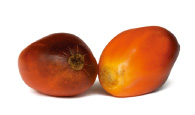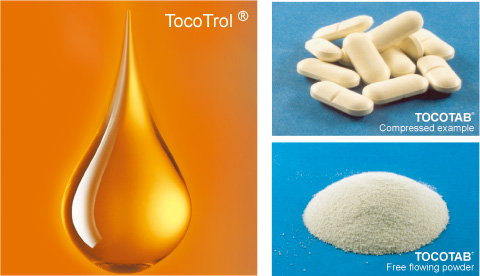60 times ahead of Vitamin E TOCOTAB®, TocoTrol®
Tocotrienol

- Natural Tocotrienol complex is a fat-soluble, fractionated and concentrated extract of botanical origin. It is part of the Vitamin E family comprising of 8 naturally occurring, lipid-soluble isomers (4 tocopherols and 4 tocotrienols)1.
Tocotrienol has 40-60 times higher antioxidant potency than alpha-tocopherol more commonly known as Vitamin E. Less well known is that Tocotrienol differs from tocopherol in that it has an isoprenoid (polyunsaturated) instead of a phytyl (saturated) side chain. This unsaturated side chain, or tail contains three double bonds which enables tocotrienol to be distributed more efficiently in the lipophillic cell membrane bi-layer thus distributing its antioxidant properties more efficiently against free radical attack2.
Alpha-tocotrienol possesses 60 times more antioxdant activity compared to alpha-tocopherol
Alpha-tocopherol is the only vitamin E compound that is commercially available both as synthetic (dl-) and natural (d) form. The other tocopherols and the other four types of tocotrienols are found only from the natural sources. We offer natural Tocotrienol complex that have been fractionated and standardized. Besides offering concentrated Tocotrienol extract oil, our unprecedented formulation technology allows us to powderize Tocotrienol oil complex with higher potency, stability and flowability than other products on the market.
- Potential Health Role
-
- Maintaining Cardiovascular Health5
- Attenuating Hyperlipidemia Carotid Stenosis6
- Lowering Risk of Breast Cancer7
- Minimising UV Induced Damage to Skin8
- Inhibiting Vasculogenesis in Cancer9
Tocotrienol Safety
Tocotrienols are part of the phytonutrients found in foods and oils such as palm olein, wheat germ, rice bran oil, barley etc. In fact, evidence found in ancient Egyptian relics suggests palm oil was traded during the time of Pharoahs3. Therefore, it implies that it has been present in the human diet for thousands of years. Relatively recent toxicity studies show no adverse effects at does as high as 2,500 mg per kg weight in rat models4. In human terms, 50-100 mg per 60 kg body weight is recommended for daily intake.
There is nothing wrong with just taking d-alpha-tocopherol, but to expect to receive optimal and maximum antioxidant protection, the full range of natural vitamin E-tocopherols and tocotrienols must be included.
- Chemical Structure of Tocotrienol

- Chemical Structure of Tocopherol

Products
TocoTrol® - For dietary supplements and cosmetic applications.
A Tocotrienol/Tocopherol complex oil. This oil can be blended or used in supplements or cosmetic applications.
INCI: Tocotrienol, Tocopherol.
TOCOTAB® - For dietary supplements and suitable for direct compression.
Based on our patented process, TOCOTAB® allows high quality tablets or capsule production with no oil extrusion.

Those who want natural vitamin E-look for the d-form. Natural forms have higher bioavailability.
References
- The Chemistry and Antioxidant Properties of Tocopherols and Tocotrienols. A.Kamal-Eldin & L.A.Appelqvist (1996) Lipids 31(7):671-701.
- Free Radical Recycling and Intramembrane Mobility in the Antioxidant Properties of Alpha-Tocopherol and Alpha-Tocotrienol. E Serbinova et al., (1991) Free Radical Biology & Medicine 10:263-275.
- On Fatty Materials found in an Egyptian Tomb at Abydos. MC Friedel (1897) Comptes Rendus 24:648-651.
- Toxicological & Pharmacological Studies on Palm Vitee. SL Oo et al., (1992) Nutrition Research 2(1):S217-S222 .
- Role of Tocotrienols in the Prevention of Cardiovascular Disease and Breast Cancer. PW Sylvester & A Theriault (2003) Current Topics in Nutraceutical Research 1(2):121-136.
- Palm Oil Antioxidant Effects in Patients with Hyperlipidemia and Carotid Stenosis – 2 year experience. DK Kooyenga et al., (1997) Asia Pacific Journal of Clinical Nutrition 6(1):72-75.
- Antioxidants in Dietary Oils: Their Potential Role in Breast Cancer Prevention. PW Sylvester & S Shah (2002) Mal. Journal of Nutrition 8(1):1-11.
- Effect of Topically Applied Tocopherol and Tocotrienols in Protection of Murine Skin form Oxidative Damage induced by UV-Irradiation. C Weber et al., (1997) Free Radic. Biol Med 22(5):761-769.
- Anti-Angiogenic Potential of Tocotrienol. T Miyazawa (2003) Oral Presentation at the Mibyou International Symposium, Tokyo, Japan.

